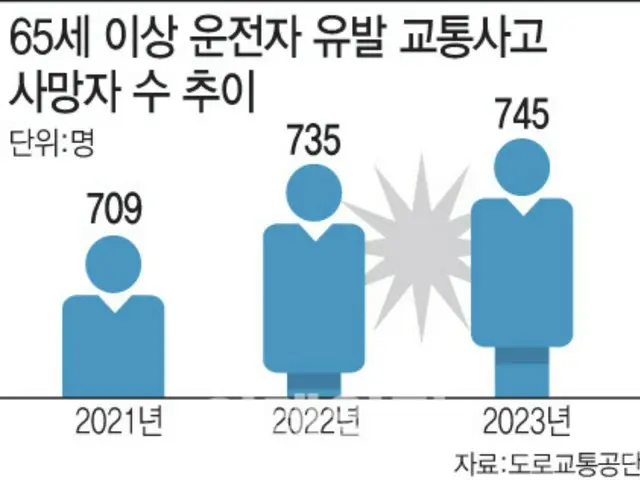There are voices calling for restrictions on driving by elderly people. However, we are on the brink of becoming a super-aging society, and discussions on the right of mobility for the elderly have not progressed, so it is not right to arbitrarily prohibit driving.
The reality is that it is virtually impossible for elderly drivers to drive at night. For this reason, some have pointed out the need to improve infrastructure for elderly drivers and actively introduce cutting-edge technology.
According to the Road Traffic Authority, the number of traffic accidents caused by elderly drivers (aged 65 or older) last year was 39,614.
The number of traffic accidents involving elderly drivers has not decreased since exceeding 30,000 in 2018. The number of deaths due to this has also increased to 709 in 2021 and 2
The number of elderly people involved in traffic accidents is expected to increase every year, reaching 735 in 2022 and 745 in 2023. Considering that the number of traffic accidents and fatalities among people in their 40s and 50s is decreasing, the proportion of elderly people involved in traffic accidents in the total number of traffic accidents is expected to increase.
The percentage will be even higher. Of all traffic accidents that have occurred so far this year, 20% have been caused by elderly drivers, up 2.4% from 17.6% last year.
The number of people with driver's licenses was 4,747,426 last year, up 29% from 2020 (3,682,632). As Korean society ages, this number is expected to increase.
However, the number of elderly people who give up driving is not decreasing. The Korean government and local governments are implementing policies to encourage people to surrender their licenses, but
Only 3.9% of elderly people participated (Seoul City, as of 2022). The reason given for this is that many elderly people aged 65 and over cannot give up their cars for livelihood and daily life.
In fact, in rural and fishing villages where public transport infrastructure is weak, it is difficult to even purchase daily necessities without driving a car, and taxi drivers and others are unable to work if they give up their licenses.
Experts say that the government needs to introduce a "conditional driver's license" system and comprehensively prepare infrastructure and systems for elderly drivers.
Professor Lee Ho-geun of the College of Future Automotive Studies said, "There may be cases where a conditional license system, like the nighttime driving restrictions for elderly drivers that have been implemented in other countries, needs to be introduced."
"We need to take into consideration a variety of factors, including the number of elderly people in rural and fishing villages," said Jeong Yong-ho, a professor of social welfare at Incheon University.
"We need support," he said. Currently, developed countries such as the United States and Japan are providing policy support for elderly drivers, such as providing driving rehabilitation specialists and support for sudden acceleration control devices.
2024/07/04 07:14 KST
Copyrights(C) Edaily wowkorea.jp 107

